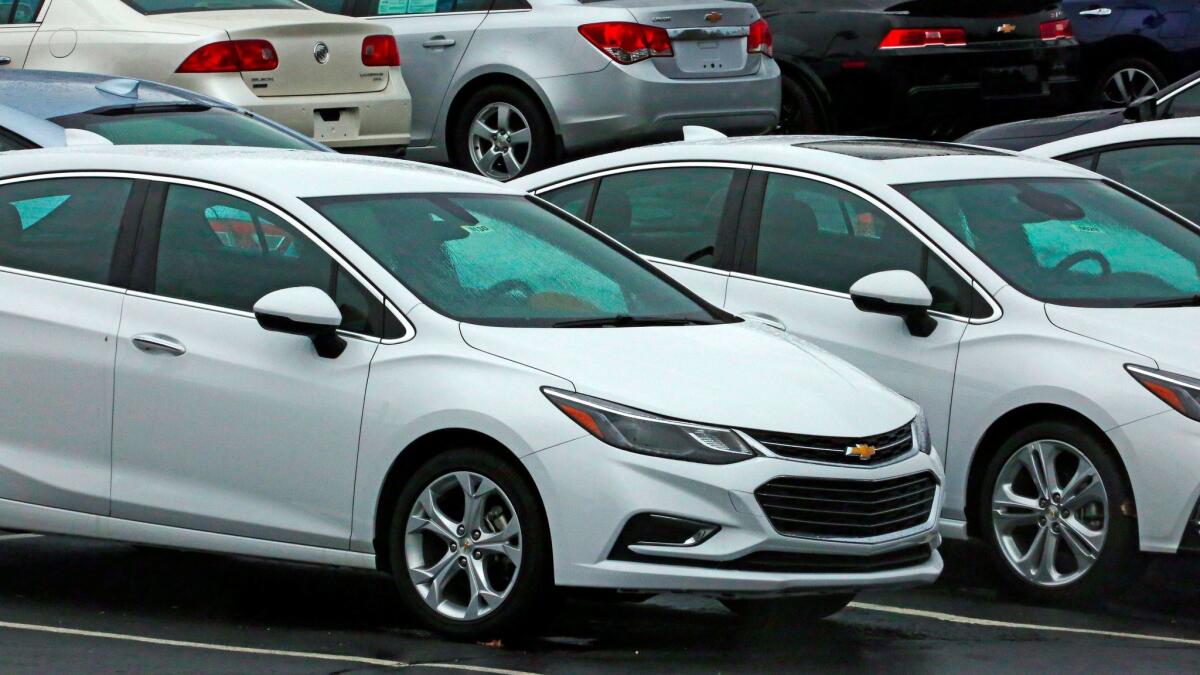U.S. car sales continue to skid, drop 5.7% in July

- Share via
Reporting from San Francisco — The economy is growing and unemployment is low, but consumers continue to shy away from new cars.
For the seventh month in a row, U.S. car sales continued to decline.
A faint bright spot is trucks and SUVs — which are continuing to sell fairly well — but even those purchases are slowing. And it’s not enough to make up for the decline in traditional automobiles.
The big problem for automakers is sedans, which are “dragging everything down,” especially at Ford and General Motors, said Brian Moody, an analyst at Autotrader.
The news is bad for the industry, but good for consumers. Prices are competitive, and dealer incentives abound, especially for small and mid-size cars.
Those incentives could be sweetened a tad around Labor Day, as dealers prepare for new cars, analyst say, but not by much. Automakers want to avoid an all-out incentives war, preferring profits over market share.
Some analysts think that the shift away from sedans could be permanent, even if gas prices rise. That’s because would-be car buyers continue to gravitate to crossover SUVs. Unlike traditional sport utility vehicles, crossovers are less like trucks and more like cars with extra room in back, and with gas mileage to match.
Meanwhile, trucks and full-size SUVs have shown increased miles per gallon across product lines, as automakers have improved internal combustion technology under pressure from federal gas-mileage requirements.
Year-over-year vehicle sales overall were down 5.7% in July.
If current trends continue, auto analysts say, carmakers are likely to sell about 17 million vehicles or fewer this year compared with nearly 17.6 million in 2016.
That’s hardly a disaster — that total still approaches record industry highs. And July comparisons are especially tough this time around. In July 2016 carmakers posted record monthly sales in a record year for vehicle sales.
But the numbers do signal a cyclical downturn, and it’s enough to force some automakers to trim back production and at least temporarily shut down assembly lines across the country.
Ford sales were down in July 7.4% year over year; GM, 15.4%.
“We have strategically decided to reduce car production rather than increase incentive spending or dump vehicles into daily rental fleets, like some of our competitors,” Kurt McNeil, head of U.S. sales operations for General Motors, said in a prepared statement.
But many analysts believe a shift in strategy may be called for.
“GM needs to consider applying tough-love metrics to some car lines,” said Rebecca Lindland, an analyst at Kelley Blue Book. “The Chevy Colorado midsize pickup truck outsold the Camaro, Impala, Sonic and Spark — combined — in July.”
Meanwhile, Toyota sales were up 3.6%, and its sedan sales have held up better than most competitors.
Sedan buyers still exist, of course, and Honda and Toyota are the cream of the crop for mass-market sedans, said Alec Gutierrez, also of Kelley Blue Book. Apparently, the idea that cars from U.S. companies are inferior to Japanese brands, developed for good reason decades ago, continues to haunt Ford and GM, despite enormous gains in quality since then.
The Ford Fusion and the Chevy Malibu “from a product perspective are just as good as Honda and Toyota,” Gutierrez said. “But the perception isn’t there, and they have to [spend more on] marketing and advertising.”
Ford, in its public statements, focused on its SUV sales, up 2.2% in July.
“Customers across the country drove retail gains of Ford brand SUVs in July. SUV retail sales were up 9.1 percent nationally, with growth in every region of the country. High-series SUVs were in strong demand with customers representing nearly 30 percent of retail sales,” said Mark LaNeve, Ford vice president of U.S. marketing, sales and service.
Automakers are also grappling with fuel emissions standards under the Trump administration, which is considering cutting back on Obama-era requirements. Automotive News reported that the auto industry’s top trade group, the Alliance of Automobile Manufacturers, is pushing for a “three-way pact” among automakers, the Trump administration and the state of California on emissions standards.
California Gov. Jerry Brown has said the state, which is allowed to set its own requirements, remains committed to tough standards.
Not wanting to have to make vehicles separately for the California market, which would hurt the industry financially, automakers would rather reach a compromise, the trade group said.
According to Automotive News, alliance head Mitch Bainwol wrote for a slideshow he’s scheduled to present Tuesday at an auto conference in Michigan that there is wide consensus on fuel economy and greenhouse gases. “The only issue is the degree of the slope,” he wrote. In other words, how fast the industry needs to move in emissions reduction.
Twitter: @russ1mitchell
ALSO
Cars are full of tech that gets outdated fast — so people are leasing, not buying
Cars whose leases are up flood the market, pushing prices down
Rolls-Royce reveals its $450,000 Phantom VIII
Takata air bag inflator ruptures in Florida crash that killed driver
UPDATES:
1 p.m.: This story was updated with additional information.







